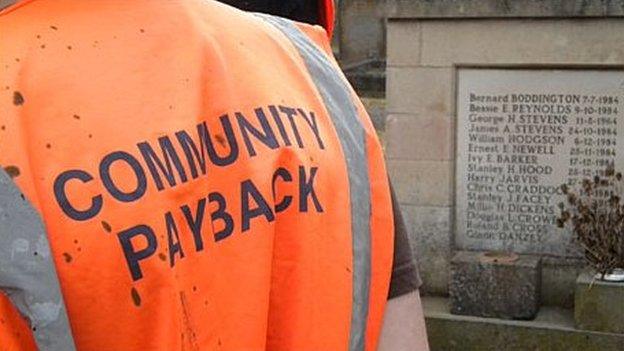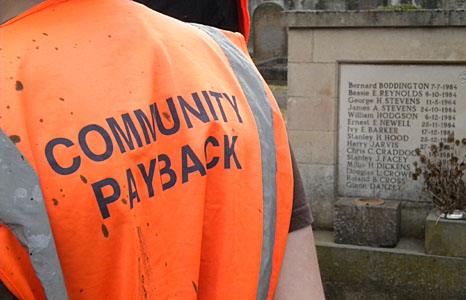Rise in unpaid work carried out by offenders in Scotland
- Published

More than 1.8 million hours of unpaid work was imposed on offenders in Scotland last year as punishment for their offences, figures, external have shown.
Of the 20,400 social work orders started in 2013-14, 78% contained an element of unpaid work.
The Scottish government said the successful completion rate for social work orders had risen in each of the last five years.
The figure rose from 59% in 2008-09 to 71% in 2013-14.
The work included the construction of cycle paths, removal of graffiti and the refurbishment of community centres, public parks and sports facilities.
The figures also showed that in the year to the end of March 2014:
Community payback orders (CPOs) accounted for 18,600 (91%) of 20,400 social work orders
80% of CPOs included an unpaid work requirement
Offenders aged 18-25 were more likely to be given an order - imposed instead of a fine or custodial sentence - than any other age group
Almost two thirds (62%) of offenders were unemployed
The completion rate for community payback orders was highest for the over 40s (81%) and those in employment (82%)
75% of offenders with an unpaid work requirement started work within seven days of leaving court.
The orders included unpaid work or other activity and treatment for alcohol, drug misuse or mental health issues.
Justice Secretary Michael Matheson said: "This government is working hard to ensure that Scotland is a safe place to live, work and visit. Recorded crime is at its lowest level for 40 years, supported by the work of more than 1,000 extra police officers in our communities.
"The figures represent the third full year of use for the community payback order - an order imposed by the courts to make offenders work hard in our communities, on both short and long term projects, as payback for their crimes - and it's clear that the orders are doing exactly that.
"The punishment should always fit the crime, and prison is the right place for those who commit serious crimes or pose a danger to communities.
"However, we know that short prison sentences do not work to rehabilitate offenders or to reduce the risk of reoffending."
Mr Matheson added: "Community sentences are more demanding, start more quickly and allow offenders to payback to the community while also addressing the underlying causes of their offending behaviour. This is a smarter, more sophisticated option and we know it works."
Social work orders include community payback, community service, probation, supervised attendance and drug treatment and testing orders.
The community payback order replaced provisions for community service orders, probation orders and supervised attendance orders for offences committed on, or after, 1 February 2011.
- Published21 December 2010
- Published16 August 2010
